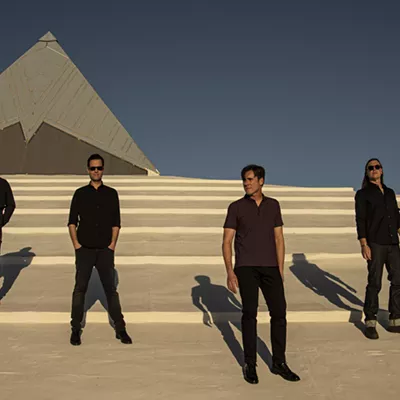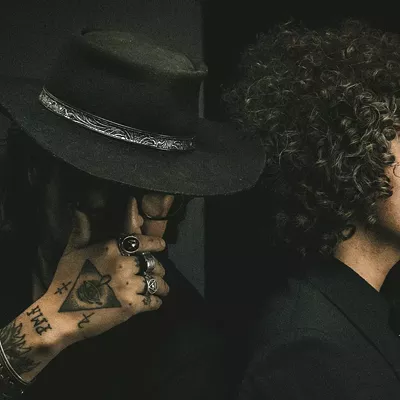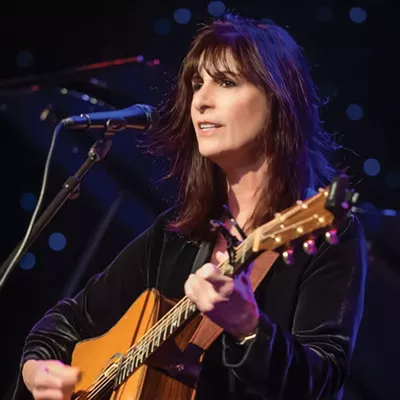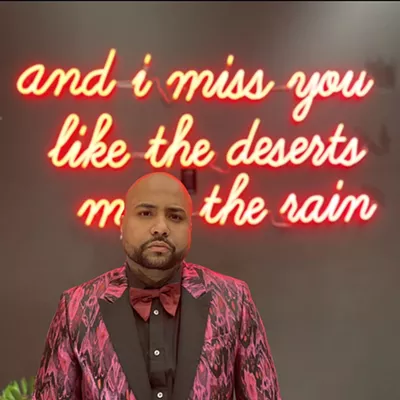The world of the Besnard Lakes is a world to get lost in.
The Montreal band deals in conceptual music, a wild, prog-influenced brand of indie rock that unfolds deliberately, always marching to a climactic peak. Sharing the songwriting duties, husband-and-wife duo Jace Lasek and Olga Goreas have both an icy darkness and a fiery bombast at their command.
"The way that Jace writes, from his perspective, he has this ongoing story about espionage and love and war, and somehow, all those elements combine in some way that it does seem to play out in the album and the album art," says Goreas during a phone call from the road outside of Winnipeg. "I come from a factual basis, from personal experience. It's things I'd write in my journals. There's his fictional element combined with my more factual element, and it seems to coincide somehow and make a bit of sense."
Goreas and Lasek met each other 10 years ago in Vancouver and started the Besnard Lakes (named for a lake in northern Saskatchewan they visit annually) after moving to Montreal in 2003. The band's second album, The Besnard Lakes Are the Dark Horse, drew widespread acclaim and was nominated for Canada's Polaris Music Prize in 2007.
To follow up, Goreas, Lasek, drummer Kevin Laing and guitarist Richard White returned to the band's own Breakglass Studio and began recording The Besnard Lakes Are the Roaring Night, a sweeping album of songs that awaken slowly but leave in fits of noise.
"We didn't really have any kind of a certain vision in mind, I suppose. When we went into the studio, it had been a while since the release of the last record, and we were champing at the bit," Goreas says. "A broader idea we always have is we want to make it sound very big and lush, with a lot of layers. We combined elements from our very first album and continued from where Dark Horse left off, with that orchestral, wall-of-sound production."
Along the way, the band came across an old mixing board, one rumored to have been used in recording Led Zeppelin's Physical Graffiti. The board was about to be sold off for parts, but Lasek and his studio business partner traveled to New York to rescue it.
"It's an amazing board, a big old beast that demands a certain kind of reverence when you're using it, and there's this whole aspect of the psychological effect of thinking about some of the people who recorded on it that makes you giddy with excitement," she says. "It sounds great, and it was an absolute pleasure to record with it. It's magic for sure."
Produced by Lasek (who has done studio work for fellow Montreal bands Sunset Rubdown and Wolf Parade), Roaring Night ties together a sense of grandeur and a menacing, apocalyptic doom. The lyrics tread through nightmarish images of war, and the album cover is a painting that features a cannon in the foreground and fires burning across the water.
The album opens with "Like the Ocean, Like the Innocent," a two-part, nine-minute suite, with wild guitar slashes and a chorus that sets a disorienting tone: "You're like the ocean / What's in your empty eyes?"
Destruction and paranoia run wild in "Land of Living Skies," another two-part suite that opens the record's second half as a counterpunch to "Like the Ocean." Rounding out the trio of lengthy, epic songs is "Light Up the Night," a slow and soaring shoegaze track that uses crashing cymbals and feedback to wind things up, and piano and a loopy guitar to wind things back down. "The Lonely Moan" closes out the 10-track record with a welcome after-the-storm calm.
Roaring Night shares some territory with instrumental post-rock: The chamber-pop falsetto and droning ambience of "Chicago Train" yield at the halfway mark to a slow chug and swirling guitars. But those moments are paired with a smoother, melodic side, like Goreas' vocals on "Albatross," which share a casual sultriness with Hope Sandoval of Mazzy Star.
Goreas calls Roaring Night "very prog-rocky."
"There are a couple of different angles with that, that we like," she says. "One is we are influenced by a lot of prog rock of yesteryear and the very long songs that have three parts or a suite or whatever. Also, when you buy from iTunes, it would be nice to have longer songs, so it's an economic type of thing."
That small concession to digital music aside, Goreas says the Besnard Lakes make music that's meant to be listened to on vinyl.
"Overall, artistically, it's always come down to the decision that we want it to play out as a record, even down to the way we sequence the songs so that it's a certain length for side A, and a certain length for side B," she says.
"I don't know if I can really relate to the downloading. I can understand that all you really need is the music, but there's this whole memory association, and you tend to remember things that are very tangible, very physical," she says. "We've spent the bulk of our lives listening to vinyl. My fondest memories seem to go back to when I was very young and listening to singles in the jukebox of my dad's restaurant."













